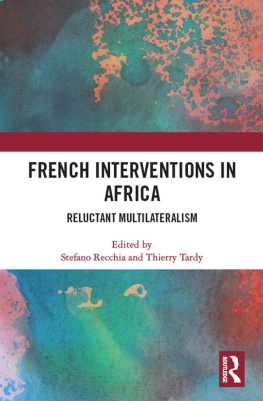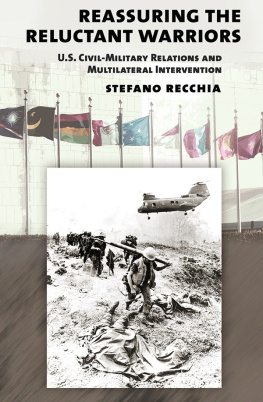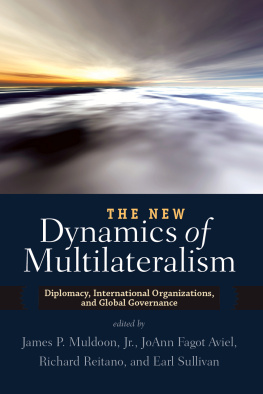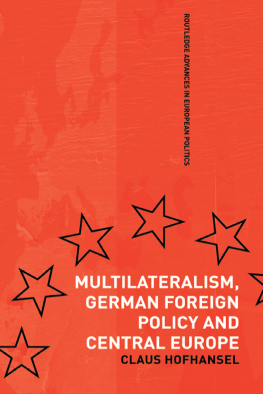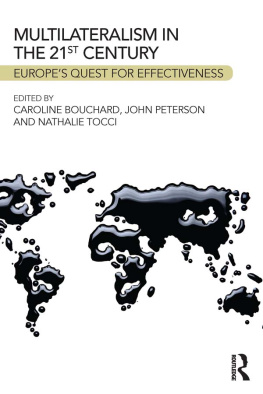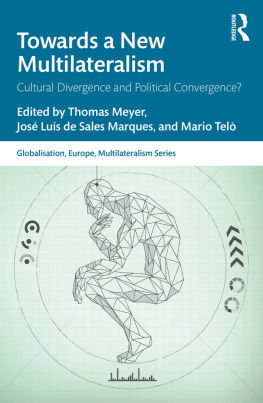French Interventions in Africa
This book explores Frances African intervention policy and related legitimation strategies through the United Nations, the European Union, and various ad hoc multilateral frameworks. Frances enduring ability to project military power on the African continent and influence political events there has been central to its self-perception as a major power. However, since the end of the cold war, Frances paternalistic interference has been increasingly questioned, not least by African audiences. This has produced a gradual and somewhat reluctant turn to multilateralism on the part of French leaders. Drawing on in-depth case studies of recent French intervention policy, this edited volume critically assesses Frances efforts to reassure critics by securing multilateral endorsements; share burdens and liabilities through collective implementation; and re-affirm its status as a major power by spearheading complex missions.
The chapters in this book were originally published as a special issue of the Journal of Strategic Studies.
Stefano Recchia holds the John G. Tower Distinguished Chair in International Politics and National Security at Southern Methodist University in Dallas, USA.
Thierry Tardy is the Director of the Research Division at the NATO Defence College in Rome, Italy, and a Visiting Professor at the College of Europe, Bruges, Belgium.
French Interventions in Africa
Reluctant Multilateralism
Edited by
Stefano Recchia and Thierry Tardy
First published 2021
by Routledge
2 Park Square, Milton Park, Abingdon, Oxon, OX14 4RN
and by Routledge
52 Vanderbilt Avenue, New York, NY 10017
Routledge is an imprint of the Taylor & Francis Group, an informa business
2021 Taylor & Francis
Chapter 2 2020 Stefano Recchia. Originally published as Open Access.
With the exception of Chapter 2, no part of this book may be reprinted or reproduced or utilised in any form or by any electronic, mechanical, or other means, now known or hereafter invented, including photocopying and recording, or in any information storage or retrieval system, without permission in writing from the publishers. For details on the rights for Chapter 2, please see the chapters Open Access footnote.
Trademark notice: Product or corporate names may be trademarks or registered trademarks, and are used only for identification and explanation without intent to infringe.
British Library Cataloguing-in-Publication Data
A catalogue record for this book is available from the British Library
ISBN13: 978-0-367-61847-6
Typeset in Myriad Pro
by codeMantra
Publishers Note
The publisher accepts responsibility for any inconsistencies that may have arisen during the conversion of this book from journal articles to book chapters, namely the inclusion of journal terminology.
Disclaimer
Every effort has been made to contact copyright holders for their permission to reprint material in this book. The publishers would be grateful to hear from any copyright holder who is not here acknowledged and will undertake to rectify any errors or omissions in future editions of this book.
Contents
Stefano Recchia and Thierry Tardy
Tony Chafer, Gordon D. Cumming and Roel van der Velde
Stefano Recchia
Thierry Tardy
Benedikt Erforth
Marina E. Henke
The chapters in this book were originally published in the Journal of Strategic Studies, volume 43, issue 4 (May 2020). When citing this material, please use the original page numbering for each article, as follows:
Introduction
French military operations in Africa: Reluctant multilateralism
Stefano Recchia and Thierry Tardy
Journal of Strategic Studies, volume 43, issue 4 (May 2020) pp. 473481
Chapter 1
Frances interventions in Mali and the Sahel: A historical institutionalist perspective
Tony Chafer, Gordon D. Cumming and Roel van der Velde
Journal of Strategic Studies, volume 43, issue 4 (May 2020) pp. 482507
Chapter 2
A legitimate sphere of influence: Understanding Frances turn to multilateralism in Africa
Stefano Recchia
Journal of Strategic Studies, volume 43, issue 4 (May 2020) pp. 508533
Chapter 3
Frances military operations in Africa: Between institutional pragmatism and agnosticism
Thierry Tardy
Journal of Strategic Studies, volume 43, issue 4 (May 2020) pp. 534559
Chapter 4
Multilateralism as a tool: Exploring French military cooperation in the Sahel
Benedikt Erforth
Journal of Strategic Studies, volume 43, issue 4 (May 2020) pp. 560582
Chapter 5
A tale of three French interventions: Intervention entrepreneurs and institutional intervention choices
Marina E. Henke
Journal of Strategic Studies, volume 43, issue 4 (May 2020) pp. 583606
For any permission-related enquiries please visit:
http://www.tandfonline.com/page/help/permissions
Tony Chafer is a Professor of African and French Studies at the University of Portsmouth, UK.
Gordon D. Cumming is a Professor of Language-Based Area Studies at Cardiff University, UK.
Benedikt Erforth is a Researcher at the German Development Institute.
Marina E. Henke is a Professor of International Relations at Northwestern University, Evanston, USA, and the Hertie School, Berlin, Germany.
Stefano Recchia holds the John G. Tower Distinguished Chair in International Politics and National Security as an Associate Professor at Southern Methodist University in Dallas, USA.
Thierry Tardy is the Director of the Research Division at the NATO Defence College in Rome, Italy.
Roel van der Velde is a Researcher at Cardiff University, UK.
Stefano Recchia

and Thierry Tardy
ABSTRACT
After the end of the Cold War, Pariss traditional, paternalistic interference in Francophone Africa became increasingly questioned. Partly in response to that, over the last two-and-a-half decades, Frances Africa policy has emphasised multilateral cooperation and local capacity building through the United Nations, the European Union, and various ad hoc multilateral frameworks. This special issue aims to unpack and assess Frances efforts to (a) re-legitimise its military presence on the African continent by securing political endorsements from multilateral bodies; (b) share burdens and liabilities through greater reliance on collective implementation; and (c) re-affirm its own status as a leading power by often spearheading collective military missions.
France is the only European country that still regularly deploys its military forces on combat missions to sub-Saharan Africa. Over the last 20 years, France has contributed to about two dozen military operations in the region.1 These operations have usually been endorsed by, and sometimes implemented through, international institutions such as the United Nations, the European Union (EU), the African Union (AU), and the Economic Community of West African States (ECOWAS). France has been in the lead for several of these operations, from the Democratic Republic of the Congo (2003 and 2006), to Chad (2008), Cte dIvoire (2002 and 2011), Mali (2013), and the Central African Republic (2013).

 and Thierry Tardy
and Thierry Tardy
